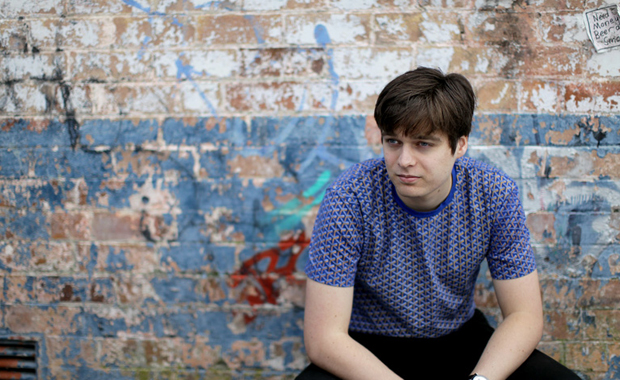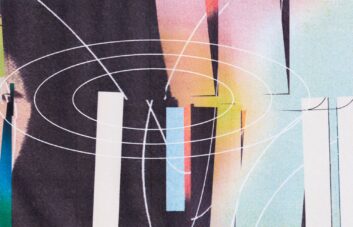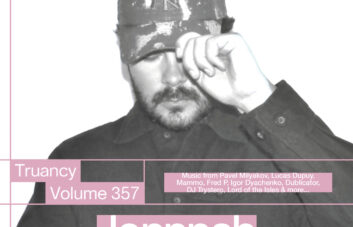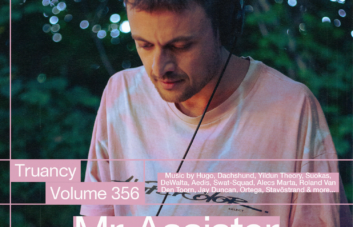
Truants readers will be familiar with Dro Carey thanks to his impossibly good 12″ release on Templar Sound last year, which Simon Docherty reviewed here. “N.R.”‘s take on steely grime tropes summed up the essence of Eugene Hector’s approach to production, either as Dro Carey or Tuff Sherm. He delights in playful subversion, his take on the sacred totems of dance music simultaneously reverent and experimental – whether they’re the propulsive grooves of house or the latent icy menace of grime and UKG. Perhaps this is partly down to his geographical distance from these genres’ hotbeds – Sydney is pretty far from both Detroit and Bow – but there’s no denying Dro’s compositional talent, his knack for an infectious bassline or refined drum pattern, and penchant for experimentation. With releases on Templar, Hum + Buzz and The Trilogy Tapes, he’s been bubbling under the radar for a couple of years now, but it looks like 2013 is set to be Dro Carey’s biggest year yet. He has an album forthcoming on RAMP Recordings, plus self releases and records with The Trilogy Tapes, Opal Tapes and more. We figured it was the perfect time to hit him up for a mix, and he more than delivered, with a Truancy-themed volume (and we’re nothing if not suckers for a concept mixtape) packed with original productions and some delicious surprises.
Next week we’ll also be hosting a Dro Carey exclusive on Truants. For now, though, read our interview, download his Truancy Volume, and enjoy the ride.
Truancy Volume 67: Dro Carey by TRUANTS.
Hey Dro, thanks for the chat. Actually, I don’t know exactly what to call you because you release under two different aliases, and you clearly devote equal attention to both projects. Is there a common thread uniting them? “With two aliases, I can explore different sounds and influences, without those influences all at once competing together in the one song or project. It helps to have some kind of defined goal with a project. So the evolution of the separate Dro and Tuff Sherm aliases has been a great way of focusing my take on the different genres that I’m into, with the common thread being that both involve experimenting with the structure and style of their source material. I’ve got a 12” coming out on Templar Sound that features both Dro and Tuff Sherm tracks, and I mix them up – like with the [Tuff Sherm] Eaux remix in this [Dro Carey] mix.”
It’s a great mix. I love the addition of Mariah Carey, and I feel there’s more to it than just having a laugh with names… Can you tell us a bit about it? “Well because it’s a mix for Truants, I sampled a few segments of a news report on comic books and juvenile delinquency, which I then structured the tempo and mood shifts of the mix around. It was recorded via VirtualDJ on my laptop. It may not be a very pure approach but it allows me to search my whole hard drive quite rapidly while mixing. As for the Mariah Carey track, pop music is the best. People might find the claim that it’s the hardest thing to produce contentious, but I don’t think anyone will dispute that it is the hardest thing to succeed in. Pop and classical are the veins that run through everything. Or at least everything with structure. And that may be as simple as the broadest structural notion of tension and release. What effective electronic producers do with dance music is form the skin over these fundamental veins, roughed up on the surface.
It’s always so hard to sum up what I’m into, but I enjoy mixes that move through a variety of genres but have a defined mood. Recent examples would be DJ Shadow or Madlib… but going back, some of my favorite mixes are by Bobby Konders and the Roadium tapes that Dr. Dre did in the 80s… in particular those Roadium swap meet cassettes. The way he mixed things as diverse as Juan Atkins, 2 Live Crew, Mantronix, all alongside his own beats he was working on for the Wrecking Crew – well, its not too dissimilar to the basic structure of my mix here: techno followed by rap, followed by my own productions.”
Seeing as you brought up Virtual DJ, I wanted to ask: it seems like in Australia buying good records is a nightmare. What do you think the corollary of that is for DJs and the scene in general? “There’s a good store here in Sydney called The Record Store but you’re right, there is definitely a dearth of them. So many people just order them online (myself included), that the demise or lack of the local stores, while a shame, is likely not inhibiting the scene or anything.”
Forgive me for knowing very little about the Sydney club scene, but what’s it like? Which Aussie producers are you bigging up these days? “There are some good nights going on in Sydney. Astral People, Compound, Templar are all contributing to forming a good scene here – yeah, there’s a great sense of community. There’s a new underground that has formed that has no ‘genre clique’ thing happening; its just all kinds of different DJs and producers in their own lanes coming together and respecting each other doing different things. I’m enjoying stuff from Gardland, Cliques, Strict Face, Albatross and Thomas William. There is a lot of great electronic music being made in Australia.”
Wicked, I’ll check them out. That kind of leads to my next question. Your music as Dro obviously draws a huge amount from grime, UKG and hip-hop. Do you think that the internet has had a globalising effect, in that respect? “Without the internet, there would definitely be some kind of radically different alternate-universe thing. I guess on that earth, where there is no internet, I would still be playing jazz, since I got into that from my piano teacher and my parents. I owe a huge amount of my musical education and influence to the internet. There’d probably be no Dro Carey without it.”
You don’t just release on Australian labels, either. In fact, your album’s out on RAMP soon. What made you want to work with them? “RAMP approached me and I was excited to release with them because their roster’s really well curated. I had been a fan of Hackman for some time, as well as other artists like FaltyDL, so, yeah, it was cool to join that stable.
When I began work on my album I basically retained my fairly rapid approach, finishing about 12 tracks in 2 weeks. Of them, there were a couple that Tom [Kerridge, RAMP boss], wasn’t really feeling, but largely he liked it. So I did some new ones to replace them and it was around that point I decided to change-up my approach – to take more time with each track and with the album as a whole. Since then the tracklist has changed quite a lot, and I’ve gone back through all of my material and kind of assessed what I can do, and what a debut album from me should represent.
A 12” can just be a pair of strong tracks. A good album can’t just be a set of 10 strong tracks, there really does need to be some kind of logic at work in terms of the sequencing of material and composition of everything. The main theme is a science-fictionalized version of Queensland in the 80s under the premiership of Joh Bjelke-Petersen. A kind of Australian cyberpunk aesthetic.”
I hope Australian cyberpunk concept albums become a trend. So apart from the album, do you have any other releases on the horizon? “Yeah, I’ve got a lot coming out this year. The basic order of things will be: the vinyl reissue/remaster of the Tuff Sherm Bandcamp release Shrapnel Maestro on Merok Records, then the Dro Carey – Vital Trails EP on Bandcamp, the album on RAMP, another Tuff Sherm 12” for The Trilogy Tapes called “Cleric”, then a Templar Sound 12”. Then some other things at some point too, including a single on Merok, a Fad TMB album on Bandcamp, a collaborative full-length album with Napolian, a collab project with Blank Mind head DANCE, some contributions to compilations, another tape for Opal [Tapes, cult cassette label], and a number of remixes too.
I’ve just started a course in Screen Music too, so in the future I hope to use what I learn there to compose for films, television and video games, and for dance companies and live ensembles.”
I’ll let you get on but before I leave you, could you complete this sentence? Inspiration is…“The only thing a creator should worry about running out of. And if you’re someone with the ability to keep finding it, you should be motivated by the fact that, though there are people out there that are more successful than you, they are working with a finite amount of inspiration – they will run out one day and you will overtake them.”



